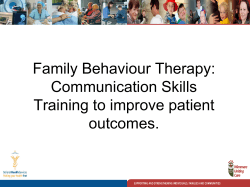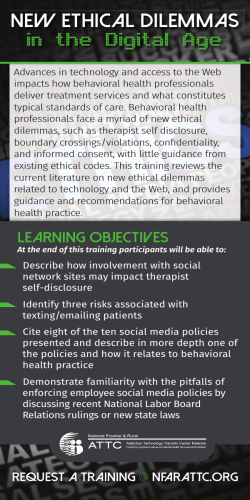
The processes involved in strengthening `combinations`
Moving For’d: The processes involved in strengthening ‘combinations’ in the Grampians region Wimmera & Southern Mallee Mental Health Service • We are located in Horsham which is the ‘Hub’ of the region. We cover the largest rural and remote area in Victoria • We are a part of Ballarat Health Service • . We provide best practice, evidenced based, person centred care to clients and their families. Wimmera Uniting Care • • • • • Wimmera UnitingCare (WUC) is a not-for-profit, community service organisation based in the Wimmera region of Victoria. We support Wimmera communities by working with vulnerable children, youth and families, those living with mental illness or a disability. We provide housing support and deliver early learning and kindergarten services. Our programs are extensive and growing. Established as a single service provider in 1981, WUC now delivers over 80 services and helps more than 8,000 people every year. WUC employ 420 staff and over 200 volunteers who reach out all over the Wimmera, covering 5 LGA’s stretching across 40,000kms. We are a community service agency of the Uniting Church network in Victoria. There was traditionally very poor collaboration between the two services. This goes back a considerable time. There were a few reasons for this: 1.A Mental Health team that was disengaged 2.Poor communication between WUC and the Mental Health Services 3.Community perception around people with Mental Health Poor collaboration left clients in a difficult position • Clients and their families were disadvantaged because: • there was poor communication between the services • A lack of knowledge of what each service did therefore the facilities that were available to the clients and their families. • Support staff not providing best practice evidenced support to the clients and their families, therefore the Mental Health Service was reluctant to refer. Moving Forward Building a better partnership between Wimmera Uniting Care and Wimmera & Southern Mallee Mental Health Service Achieving this • New Manager appointed to Youth and Community Services, WUC. • Managers of both services had similar views moving forward on how to improve the collaboration between the two services. • It was decided to embark on the Meriden Training Programme from the UK. This was facilitated by Dr. Julia Hailes from BHS Education Dept. • A research project was undertaken by the manager of the WASMMHS, the Manager of WUC , Dr. Julia Hailes, and Coelina Mills, Project Officer from Ballarat Health Meetings between managers • There were meetings between the Executive Directors of each service and the Managers of each service • There was a belief that the present way of doing things wasn’t working. Meetings were held were it was shown that the Directors and the Managers had a shared view of how to improve the collaboration between the services for the benefit of the clients and their families. There was discussion between the Managers how to engage the staff and build new relationships between the two agencies WHAT WE DID • Both Managers are seen to liaise frequently. • The manager of the Mental Health Service has been asked to sit on the interview panel in WUC. • Hot desks have been set up in both services. • Support Workers form WUC have been invited by clinicians from the Mental Health Service to actively engage with clients and their families in sessions where appropriate • Both Managers have led the way so to speak by leading by example • Attending the Meriden Training Sessions • Working in a collaborative way ASSESSMENT USED BY WASMMHS • WASMMHS use an INA, (Individual and Family Needs Assessment) for all clients and their families which provides for: • Comprehensive Treatment • Collaborative Treatment • Completed by clients and their families ASSESSMENT USED BY WUC • WUC use the Recovery Star Model WUC use the Recovery Star Model for all clients which is a tool designed to support and measure change when working with vulnerable people • It is a care planning, review and outcome tool, measuring subtle changes in attitudes, motivation and behaviour as clients travel towards their end goals. • The tool is designed to empower the client and aid in consistency and effectiveness of case work Gaining new skills Sometimes you have to take risks Gaining new skills • Identified an area that was relevant to both services. – This was Communication Skills Training. • Is derived from the Meriden Behavioural Family Therapy Program. Communication Skills Training • Teaches clinicians how to teach clients and their families communication skills. • Topics covered in the training are: – – – – – – Introduction to communication skills training Making a positive request for help Expressing positive feelings Expressing negative feelings Active listening Problem solving Benefits • Clinicians: – Gain new skills and knowledge – Improve working relationship • Clients: – – – – Improve communication skills Reduce stress Reduce Relapse Improve Problem Solving Skills Monthly Supervision to support the implementation of the training • Purpose: to give support, advice and strategies on the implementation of the training into clinical practice. • Supervision will be conducted by Chris Mansell, Deputy Director, from Meriden BFS Program, who is based in the United Kingdom. Monthly Supervision • Clinicians will complete a preparation for supervision questionnaire. – Is a tool to help guide supervision sessions – Focuses on • • • • • What is working in the implementation of the training What you need help on What you have tried already What you have thought about trying What your new plan is after supervision Benefits of Supervision between WASSMHS and WUC • Getting support and new strategies to help with the implementation of the training. • Builds relationships between services as clinicians share their experiences, and provide suggestions to help other clinicians • Questions and the corresponding answers will be compiled into a handbook which any clinician can use in the future. Key points in building a successful partnership 1. Start with the CEOs and managers of the organisations involved. 2. Managers model the relationship they would like for their staff to see. 3. Build new skills together as a group. 4. Give your staff a good experience. Benefits of a good partnership • For Services: – Increases communication between services. – Gives each service a better understanding of what each other does – Developing positive attitudes – Promotes effective work Benefits of a good partnership • For clients: – Increased communication between services. – Both services can use the same therapy – More Effective and Focused Treatment Glossary • BFS - Behavioural Family Therapy • WASMMHS – Wimmera and Southern Mallee Mental Health Service • WUC – Wimmera Uniting Care • INA – Individual and Family Needs Assessment
© Copyright 2025










